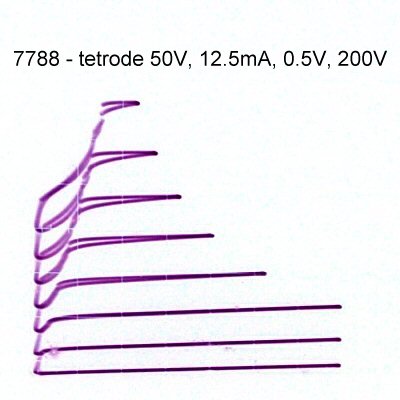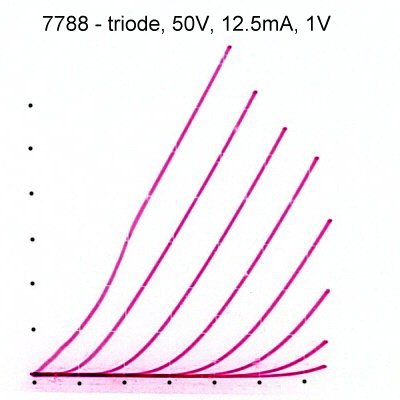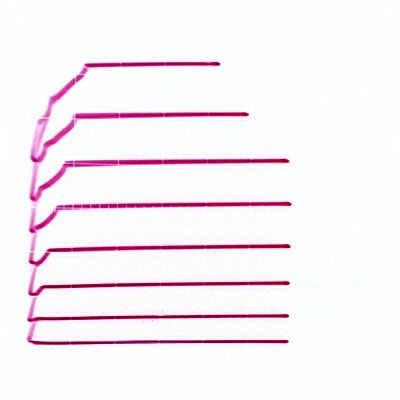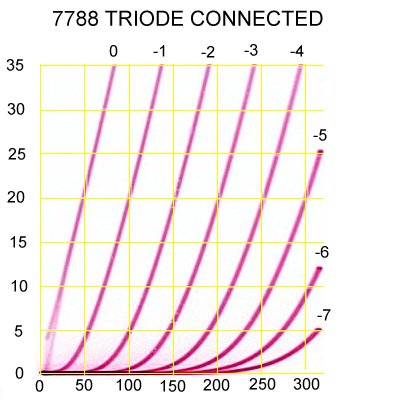|
Posted by rafaroxlm on
02-14-2006
|
|
As you may know the 7788 is a high transconductance pentode which should in theory be able to give higher audio resolution than say 12AX7, 6072 tubes in tube mic pre designs. On search here the 7788 was mentioned as being used as the first tube in a phono preamp design but no schematic was available. Woild appreciate assistance from the tube Gurus here in coming up with a design for a 7788 transformer input tube mic pre design. Have some UTC A-10, LS-10 as well as output trans available.
|
|
|
|
Posted by hagtech on
02-14-2006
|
Why do you suggest that a pentode will "give higher audio resolution"? What evidence is this theory based upon?
jh
|
|
|
|
Posted by Romy the Cat on
02-14-2006
|
 rafaroxlm wrote: rafaroxlm wrote: | | As you may know the 7788 is a high transconductance pentode which should in theory be able to give higher audio resolution than say 12AX7, 6072 tubes in tube mic pre designs. On search here the 7788 was mentioned as being used as the first tube in a phono preamp design but no schematic was available. Woild appreciate assistance from the tube Gurus here in coming up with a design for a 7788 transformer input tube mic pre design. Have some UTC A-10, LS-10 as well as output trans available. |
|
Rafaroxlm,
I’m very much not a guru but I feel that 7788 is a freakishly wonderful tube, probably one of the best out there for the two stages correctors considering the relations of gain to sound quality and to noise. There are quite few ideas of 7788 phonostages around it are all depends what a person might look for. I use 2 phonostages with 7788: one with passive RLC filter (designed by Thorsten) and one with low capacitance feedback to high impedance, identical to what was used in EAR-834P (designed by Dima Kireev)
The idea to use 7788 come to me a few years ago form a guy that I know who used 7788 for almost 30 year for exactly the same purposes that that you intended to use it: the microphone preamps. After he made me to use this tube I do love the tube a lot:
(http://www.goodsoundclub.com/TreeItem.aspx?postID=171#171)
I have built and used tree 7788-based RIAA correctors that give me some perspective to this tube. Use a few dozen Ohm grid stopper and ferrite bids sitting at the grid entry. Use shock-mounted tube sockets. I do not think that my operation point would be relevant as it would be a property of the specific application, impedance loading and so on. What is very important is paying super attention to the screen voltage and it’s type. Usually pentodes sound very idiosyncratic: hard and sharp. Some Morons recognize it as evidence of “quality” but I degree with them. The artistry of using pentodes is to teach the pentodes to sound soft and liquid. It is possible with 7788 and the changing the type of the screen voltage is one of the primary tools to accomplish it.
In the end I would agree with Jim Hagerman and would propose that the “higher audio resolution” is a bogus concept. Mostly people recognize the “higher audio resolution” as the excessive HF extension and zipping of sound. In reality, there is no such a thing as “audio resolution”. Beside if one would claim that 7788 has higher audio resolution then 12AX7 then a person should propose that 12AX7 has deficiency of “audio resolution”. What would it mean and how a person could judge “audio resolution” (whatever it means) without a context of the specific application and without the specific results? The 7788 is mHz level TV tube and defiantly faster then 12AX7 but the irony is that the 7788 begins to sound “humane” only when it’s UHF bandwidth got killed and what it begin to sound like a triode (12AX7) , but a triode with ultra high gain and ultra low noise.
Rgs,
Romy the caT
|
|
|
|
Posted by rafaroxlm on
02-15-2006
|
Thanks for the comments Romy. Would appreciate pointing out where the schematic is for the 7788 phono preamp or even better your friend´s 7788 mic preamp schematic. I can use the phono stage circuit minus the RIAA as a starter and then play with the grid voltage as needed.
Jim H. The 7788 as a first tube in a mic pre either triode wired or pentode wired offers some theoretical advantages considering the high Gm....the remarkable closeness of the grid to the cathode should give very fine control. Theoretically more so than twin triodes although yes the UHF may need to be cut off.
At any rate it would be worth trying as a possible significant improvement.
Rgds
Rafaro
|
|
|
|
Posted by hagtech on
02-15-2006
|
Yeah, so the closeness of the grids results in a higher current gain. So what? What is the relationship between gain and sonics? Are you saying that all high gm tubes sound better than low gm tubes? And does that include 300B and 2A3?
One problem with these high gm tubes is microphonics. The close grid spacing demands higher dimensional tolerance, stability, and stiffness. Parameters drift a lot as the tube warms up and settles. On the other hand, high gm tubes tend to be much better constructed.
I am curious, Romy, do you run this tube as a pentode or triode? I would guess pentode, given the very high gains you are achieving.
I once designed a modem to operate over an old submarine telephone cable. It used vacuum tube repeaters every 20 miles. They were pentodes. And the requirements for linearity were really high. They were getting 50dB out of one tube! SNR was also very good. Wish I remember what tube that was.
jh
|
|
|
|
Posted by rafaroxlm on
02-17-2006
|
|
Jim it was probably the 7788. This "supertube" was military stockpiled and difficult to get until about 8 years ago when finally military released. Then you could get them for $5 but people are getting wise now as per the $30-40 prices. I been wanting to try this tube as a first tube in a tube mic pre since released but been too complicated. Amperex had very tight tolerances and high reject rates with this one. But it has very high gain, linearity and low microphonics as per the heavy duty construction. Refer to this 1961 reprint. http://www.elecdesign.com/Articles/ArticleID/4080/4080.html Apparently you are a designer would appreciate help with project if possible, feel free to E mail
|
|
|
|
Posted by hagtech on
02-17-2006
|
Sounds like a great tube. Stu just found a bunch in his stash and asked about them on asylum - totally unrelated to this post. Gold pins, superb construction, etc. So it must be something special. Could be great for your mic pre. You might want to try both pentode and triode modes.
"you are a designer would appreciate help with project"
The last thing I need is help designing circuits. However, I am very open to any sort of customer feedback or suggestions.
jh
|
|
|
|
Posted by Romy the Cat on
02-17-2006
|
 hagtech wrote: hagtech wrote: | Stu just found a bunch in his stash and asked about them on asylum - totally unrelated to this post.
|
|
Did your Stu ever learn that anything that deserves any real attraction or interest and exposed to the asylum’s barbarians get vandalized or juts got misunderstood by the asylum’s Morons?
 hagtech wrote: hagtech wrote: | Gold pins, superb construction, etc. So it must be something special. Could be great for your mic pre. You might want to try both pentode and triode modes.
|
|
Pentode, the triode does not sound as good as some other "triodes", like 7721 for instance….
The Cat
|
|
|
|
Posted by hagtech on
02-18-2006
|
My Stu never got a reply by the asylum inmates. Maybe nobody there ever heard of a 7788. No help.
jh
|
|
|
|
Posted by Romy the Cat on
02-18-2006
|
 hagtech wrote: hagtech wrote: | | My Stu never got a reply by the asylum inmates. Maybe nobody there ever heard of a 7788. No help. |
|
7788, gain/noise/bias vise, as a penthod, is pretty much idle first stage for not-extra-stages low input preamps. (Phono, Mic etc…)
http://www.goodsoundclub.com/PDF/7788.pdf
It is very stable by parameters . I have many of them, from different brands, and all of them are identically good. You can take any two of then drop replace and see that gain, nose will be the same and event a plate voltage will drift with no more then 1-5V (I drive them at 150V). 7788 has very neutral sound, not “sticky”, not “glossy” and not “showy”. It might be at “too fast” side if not properly used, but it is only if not properly used. All together it is a phenomenal thing.
Rgs,
The caT
|
|
|
|
Posted by hagtech on
11-05-2007
|
Ok, so it took me awhile. I finally got around to doing a design around this tube, believe it or not, as a driver for a 2A3. It just seemed right. Bought some 60's vintage(?) Amperex "PQ" on eBay. Well, here's what it looks like:

That's 50V/div horizontal, 12.5mA/div vertical. Screen at about 200V. The looping caused by a power supply time constant in my curve tracer (the loop ain't real). I forget where zero is. I think this was 0.5V per grid step. The severe kink makes this look like a tetrode. In fact, maybe that's because I hooked it up as a tetrode? Aw crap, I left pin 8 floating. Anyway, here's the triode-strapped version:

Looks incredibly linear. The kink is still there. I let you know tomorrow if it is real. Grid steps are 1V/div, starting at 0V. Turns out plate impedance is about 2.8k, mu is roughly 50. Linearity is awesome. Shoot, I guess that makes this a supertube.
jh
|
|
|
|
Posted by Romy the Cat on
11-05-2007
|
Jim,
It is the super tube – you forgot to mention the amount of noise with its transconductance…. You use the 7788 as a driver to drive 2A3? This is kind of strange: the 7788 has relatively low bias and a typical line voltage should sent 7788 deep into A2 and in clipping. Do you use it with feedback lifting up the bias with signal? You might look for 7721 tube that has the same gain but 1V more on base and generally sound better as a triode-driver, if I am not mistaken I have sent you it the 7721. BTW, in my phonocorrector (Dima’s design) I used 7788 at 150V and input pentode and following tests with voltage variations confirmed that I had better result at 145-160V… Sure, it was the result of my special application and it might not be true in your case.
Rgs, the caT
|
|
|
|
Posted by hagtech on
11-05-2007
|
Ok, once I got pin 8 connected to pin 1, the curves came out straight. Here is the true pentode plot at 200V screen, 0.5V/step:

And here is my new data sheet plot for triode mode:

For reference, at a bias of Va = 200V, Vg = -3.0V, we get roughly Ik = 20mA, rp = 2.5k, mu = 50, gm = 20mA/V.
| typical line voltage should sent 7788 deep into A2 and in clipping |
|
Yes indeed. I bias my amp driver at about 175V, -2.5V, 20mA. This means an input signal above 1.7Vrms will send it into A2 (constant current operation). However, the 2A3 needs only +/-40Vp in A1, and that translates to about 0.7Vrms at input, which would be the stated sensitivity of the amplifier. This means I have a little headroom in the driver and it should stay quite linear under normal conditions. I also am using an interstage tranny which is I think 1:1.5, so that gives me even more gain. Hard to tell yet, as I have not calculated the losses due to loading (probably about -2dB).
jh
|
|
|
|
Posted by Romy the Cat on
11-05-2007
|
… I do not consider it as an interesting driver and I have a good feeling that you will review your desire to drive 2A3 with 7788. 7788 is phenomenal for different application (ultra low noise + ultra high Mu) not for driving power triodes. Jim, if you looking for a driver, why don’t not you try my 6E5P. This tube is truly super driver, with phenomenal sound and with ability to throw some sonic tricks that the 5687-class drivers could only dream about. It is 35 times gain, with 8-9 watt on plate... and it is in 9-pin body. This driver alone can easy to drive 6C33C, 845, 211, GM70…. You have over -4V bias and you can get over 100V AC juts from one driver. The 6E5P sound is capable at the same time to express that large “elephant” brutal attitude of GM70 and the delicacy and sophistication of 2A3. It is truly amassing tube and what is very important - thankfully to me it is extremely cheap to buy anywhere. Try it and you might enthusiasticly loose your virginity about the drivers…
Rgs, Romy the caT
|
|
|
|
Posted by hagtech on
11-05-2007
|
 Romy wrote: Romy wrote: | | why don’t not you try my 6E5P? |
|
I didn't want to steal any of your ideas.
Although, admittedly it was my backup plan. No question the 6ep5 makes for a superb driver tube. Had not really looked into who has stocks. Seemed to me there were enough 7788 around on eBay and whatever. I am also using it in a DAC output stage. Gain and driver in one. I needed 30dB or so and then a reasonable output drive. The 7788 has both. I like it better than the 12aX7 gain into 12AU7 cathode follower I had previously used.
jh
|
|
|
|
Posted by Romy the Cat on
11-07-2007
|
 hagtech wrote: hagtech wrote: | | I didn't want to steal any of your ideas. |
|
This is very bogus notion. If the 6E5P is somebody’s idea then would be not me but Dima’s as he discovered the tube “for Sound aplicatios” in 90s while he was fixing a TV. However, your approach, Jim, is very strange to me - who care whos idea it would be. Do we care about respect to Sound of about a bogus content of artificial egos? I think you confused my site with DIYAudio…  hagtech wrote: hagtech wrote: | | Seemed to me there were enough 7788 around on eBay and whatever. I am also using it in a DAC output stage. Gain and driver in one. I needed 30dB or so and then a reasonable output drive. The 7788 has both. I like it better than the 12aX7 gain into 12AU7 cathode follower I had previously used. |
|
I do not believe in driver/input stages neither around 12aX7 not around 7788 or the rest low-biased, low-power tubes. Run 0dB out of your DAC and see what will clip first - output transformer or driver stage. In a proper design the transformer should choke first…
Rgs, the Cat
|
|
|
|
Posted by hagtech on
11-07-2007
|
| This is very bogus notion |
|
Well I am glad to see you feel that way. You never know - some people cry foul when such happens. "Hey, that was my idea! And now this guy stole it and put into his own product." It happens. As a manufacturer I usually try to stay clear of situations that could result in a negative business impact. I don't need people on the net thrashing me like they do Welborne. Similarly, I rarely comment on politics publicly, as it can alienate a large segment of the buying population. (Buck Fush!)
There is also the case of where I come up with something innovative, and would prefer it not to be copied by others, eating into my potential profits. One example is the UFO. It helps if I am not a hypocrite.
| I do not believe in driver/input stages neither around 12aX7... |
|
I understand. It is best practice to design for +10dBu line level for full power. That way, you can take the output of a redbook CD player directly into a stage without clipping. However, usually we have volume controls or some sort of preamplifier in the path, and so deviating a little from this specification isn't so bad. I ended up have a full power sensitivity (just prior to the onset of clipping) of 0.5Vrms. I suppose one could argue that I have 12dB too much gain. Can change loading on my interstage tranny to drop 6dB. Or change tubes. As it is now, I have way more headroom in the driver stage that I need.
jh
|
|
|
|
Posted by hagtech on
12-31-2007
|
I was rummaging through a pile of tubes and came across a pair of 8233. Medium size tube, gold pins, PQ. I think it might have been a video output tube for an old Tek scope. So I looked it up on Duncanamps. 10W plate dissipation, and in triode mode it looks like about mu of 30 and Ra of 500 ohm. High transconductance. Looks to me like this would also make a fine driver tube. It could make a 1W SET amp or be great for a headphone stage. Capable of a lot of current. Interesting tube. Too much gain to make a linestage out of it.
jh
|
|
|
|
Posted by Romy the Cat on
12-31-2007
|
Jim,
Isn’t it the same as the famous European E55L? If so then it is a very popular in certain circles tube and it is a good driver. I never tried it myself though and I can not comment about it sonic signature or how to use it. BTW, the way how you discover the 8233 was exactly how Dima discovered in 90s the 6E5P. He has a box of the TV tubes and he juts tried them until he found the one that attracted him as “strange construction”…
The Cat
|
|
|
|
Posted by hagtech on
01-01-2008
|
Yes, it is an E55L. I wonder how stable it is. Interesting to me how many of these "uber-tubes" are designed for RF operation. Should make a wonderful oscillator. The other find I came across was a pair of 6CL6. Makes me want to design all kinds of new amplifiers. The video amp schematic in the 6CL6 data sheet shows the exact series-shunt inductive peaking I used many years ago, but with transistors.
jh
|
|